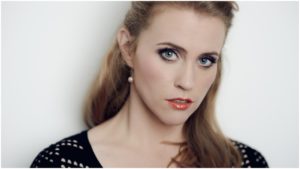
Q & A: Soprano Rachel Willis-Sørensen On Donna Anna At the Met Opera & Her Role Debut As ‘Rusalka’
By David Salazar“Don Giovanni” is undeniably one of the great operas in the standard repertory. While the title character is the focal point of the story, there is no denying that the opera simply can’t work without a potent contrasting force in the form of Donna Anna. That is the challenge for any soprano taking on the role of the Mozart heroine.
When the Metropolitan Opera revives its current production of the opera on Jan. 30, 2019, Rachel Willis-Sørensen will be tasked with bringing on the leading lady to life.
For the soprano, a winner of the Met Opera’s National Council Auditions in 2010, Donna Anna represents just the second role that she will take on with the company; she previously performed the role of the Countess in “Le Nozze di Figaro” in 2014, 2016, and 2017. Outside the Met, she has built up a solid career that has seen her appear at the Royal Opera House, Houston Grand Opera, Santa Fe Opera, Semperoper Dresden, the Deutsche Oper Berlin, the Teatro Regio di Torino, the Bayerische Staatsoper, and the Opernhaus Zürich, among others.
The soprano recently talked to OperaWire about her upcoming “Don Giovanni” performances at the Met, as well as her role debut in “Rusalka.”
OperaWire: You are performing the role of Donna Anna at the Metropolitan Opera this season. Who is Donna Anna in your view?
No matter how you spin this story, Don Giovanni throws an enormous wrench in her plans. Suddenly everything is different. I have been asked to play her in a variety of ways, but that is certainly true of all of them. Things can never be the same once he has become involved.
OW: What are the particular challenges of this role both vocally and dramatically?
OW: How do you relate to Donna Anna? In what ways is she similar and different from you as a person?
Maybe I’m flattering myself, but what I can relate to is the strength. She is so dedicated to what she wants. In fact it seems to be there are only two autonomous forces in this opera and all other characters revolve basically around them. One is Don Giovanni, and the other is Anna. I like to fancy myself a force to be reckoned with as well!
OW: Do you have a favorite musical moment in the score?
RWS: My favorite musical moment is probably the stunning trio with Donna Elvira and Don Ottavio near the start of the Act one finale “Protegga il giusto cielo il zelo del mio cor.” It is so beautifully written and a good mantra for overcoming fear!
OW: In what ways is Mozart’s music a perfect fit for your voice?
RWS: Well it certainly is an effective voice teacher that is for sure! I have learned so much about safely controlling my instrument by trying to accomplish this music successfully! There are quite a few demands and it constantly threatens to become tense in my larynx to meet them! There is so much drama in the music but it must be contained without becoming contrived. It’s a big challenge, but one that I love! I also feel that Mozart is just good for a person. It feels healthy going into my ears!
OW: You are set to make your role debut later this season as Rusalka at the San Francisco Opera. What excites you most about this opera?
OW: What do you hope to explore in your interpretation of the character of Rusalka?
RWS: What a journey she takes, right? From idolizing the Prince and the idea of loving and being with him to the bitter disillusionment of his perceived betrayal with the foreign princess. It’s amazing to play a good guy and a bad guy in the same show!


